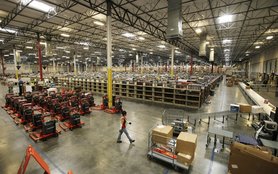Ahead of Tax Day, report outlines corporate tax dodging and rigged tax rules
The 50 biggest US companies, including global brands such Pfizer, Goldman Sachs, Dow Chemical, Chevron, Walmart, IBM, and Procter & Gamble, have stashed more than a trillion dollars offshore and used more than 1,600 subsidiaries in tax havens to avoid billions of dollars in tax each year, according to Oxfam America. In a new report released today ahead of Tax Day, Oxfam outlines how corporate tax dodging costs the US an estimated $100 billion each year, a gap that the average American taxpayer would have to shell out an extra $760 to cover. Oxfam called on the US Congress to urgently pass legislation to break the rigged system that allows this to happen.
On the heels of the Panama Papers scandal revealing a secret multi-billion dollar trail to the tax havens where corporations and the wealthy stash their fortunes, Oxfam’s new report, “Broken at the Top,” shows how large US companies use tax havens, offshore holdings and other tricks to dodge their taxes. The report reveals that the same companies are among the largest beneficiaries of US taxpayer funded support, receiving a staggering $11 trillion in federal loans, loan guarantees and bailout assistance from 2008-2014 even as they avoided hundreds of billions of dollars in taxes over the same period. Oxfam calculated that during this period, these 50 companies collectively received approximately $27 in loan support for every $1 they paid in federal taxes.
“As Americans rush to finalize tax returns, multinational corporations that benefit from trillions in taxpayer-funded support are dodging billions in taxes,” said Raymond C. Offenheiser, President of Oxfam America. “The vast sums large companies stash in tax havens should be fighting poverty and rebuilding America’s infrastructure, not hidden offshore in Panama, Bahamas, or the Cayman Islands.”
According to Oxfam, the largest and most profitable companies use offshore tax havens and other aggressive and secretive schemes to stash profits and dramatically lower their corporate tax rates in the United States and developing countries alike. The companies, which made nearly $4 trillion in profits globally between 2008 and 2014, paid an average effective tax rate of just 26.5% – well below the statutory tax rate of 35% in the US and well below the tax rate of an average US worker of 31.5%.
“For every $1 spent on lobbying, the largest 50 companies received $130 in tax breaks and more than $4,000 in federal loans, loan guarantees and bailouts,” continued Offenheiser. “Multinational corporations use the rigged system to benefit themselves, leaving the rest of us paying our nation’s bills.”
“It is truly unfair to the thousands of American small business owners who work hard and play by the rules that multinational companies use offshore tax havens to avoid paying their fair share for the critical public infrastructure programs that strengthen the US economy," said Morris Pearl, former managing director at BlackRock and Chair of Patriotic Millionaires, a group of 200 high-net-worth Americans who are committed to building a more prosperous, stable, and inclusive nation.
“I speak for myself, my business, and the countless businesses like mine that are marginalized by wealthy special interests and lobby groups holding water for big business: there should be no ‘get-out-of-taxes-free’ card or special set of rules that apply only to the largest and most profitable companies," said Deborah Field, who owns Paperjam Press in Portland and sits on the Executive Team of the Main Street Alliance of Oregon.
The same tricks and tools used by multinationals to dodge US taxes sap another estimated $100 billion every year from poor countries, preventing them from making crucial investments in education, healthcare and infrastructure that could help lift their societies out of poverty. Oxfam estimates that $100 billion could provide safe water and sanitation to more than two billion people who currently go without.
“When corporations don’t pay their fair share of taxes, governments – rich and poor – are forced to cut services or make up the shortfall from working families and small businesses. Neither is acceptable,” said Offenheiser. “Congress must finally pass the Stop Tax Haven Abuse Act and President Obama must work with other world leaders to reform our broken global tax system. Companies, for their part, must stop their abuse of tax havens, be transparent about their tax practices, and pay taxes where their actual economic activity takes place.”
The Oxfam report analyzed the tax practices of the 50 largest public companies in the US according to the Forbes 2000 list: Alphabet (Google), American Express, American International Group (AIG), Amgen, Apple, AT&T, Bank of America, Berkshire Hathaway, Boeing, Capital One Financial, Caterpillar, Chevron, Cisco Systems, Citigroup, Coca-Cola, Comcast, ConocoPhillips, CVS Health, Dow Chemical, Exxon Mobil, Ford Motor, General Electric, General Motors, Goldman Sachs, Hewlett-Packard, Home Depot, Honeywell International, IBM, Intel, Johnson & Johnson, JPMorgan Chase, Merck, MetLife, Microsoft, Morgan Stanley, Oracle, PepsiCo, Pfizer, Phillips 66, Procter & Gamble, Prudential Financial, Qualcomm, Twenty-First Century Fox, Inc., United Technologies, UnitedHealth Group, US Bancorp, Verizon Communications, Wal-Mart Stores, Walt Disney, and Wells Fargo.


